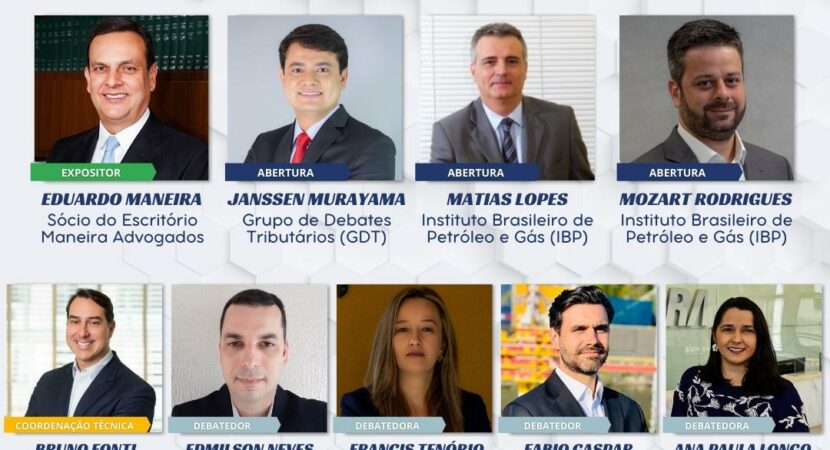
One of the main impacts of the tax reform in Brazil would be to simplify the tax system, in addition to extinguishing taxes such as PIS, Cofins, IPI, ICMS and ISS through a Tax on Transactions with Goods and Services (IBS).
Since it began to be considered by the Federal Government, in the late 80s, other impacts of the tax reform would be to modernize the collection of taxes and duties to favor the competitiveness of companies in the most diverse sectors, including those operating in the oil and gas sector. .
However, the main obstacle is the slowness of the political sectors, with Law Projects (PL), Projects to amend the Constitution (Pec) among other legislative instruments that drag on, collide with unconstitutionality or the lack of willingness of politicians.
This is the common analysis and opinion of experts who study and call for reform, as they see important results for the Brazilian economy.
Last Wednesday (24), the Tax Debates Group (GDT) and the Brazilian Institute of Oil and Gas (IPT) promoted a webinar to discuss tax reform and its impacts on the sector. The meeting was remote and broadcast live on the GDT YouTube channel, with great interaction from Internet users.
The event was opened by Janssen Murayama (GDT), Matias Lopes and Bruno Fonti (IBP). With a lecture and presentation by lawyer Eduardo Maneira and panelists Edmilson Neves (Petrobras), Francis Tenório Duarte Pinto (Ipiranga), Fabio Gaspar (Shell) and Ana Paula Longo (Vibra).
History of tax reform in Brazil
Lawyer Eduardo Maneira carried out a historical survey of what each Federal Government has done in relation to tax reform in Brazil, from the Collor era to Michel Temer.
The reasons on which the requests for a tax reform were based were basically the same as they are today: the complexity of the Law, the high litigiousness and legal uncertainty.
- Collor government and tax reform – There was no concrete proposal, nor anything approved in that sense.
- Government Itamar Franco – In 1993, Constitutional Amendment No. 03 was approved, creating the IPMF, extinguishing the Income Tax surcharge and the Fuel Retail Sales Tax.
- Governments Fernando Henrique Cardoso – In 1995, PEC nº175 was shelved and EC nº33/01 was approved (extension of the taxable event for export ICMS).
- Lula governments – In 2003 they transformed PEC nº41 into EC nº42 and the non-analysis of PEC nº233 of 2008
- Dilma Rousseff governments – There was no proposal.
- Michel Temer government – There was no proposal.
What are the proposals and opinions in 2021 on tax reform that would also impact the oil and gas sector
Among bills and amendments to the Constitution, there are some ideas in the pipeline that have to do with tax reform and that would certainly bring the same impacts of modernizing the system to the oil and gas sector. Are they:
- PEC No. 45 presented in 2019 but which is ready to be discussed in the plenary of the Chamber.
- Bill No. 2.337/21 awaiting consideration by the Senate. It has already been approved by the House.
- Draft Amendment to the Constitution No. 110 is in the hands of the rapporteur Senator Roberto Rocha (PSDB)
- Bill No. 10 who is on the Justice and Citizenship Commission
You may also like
- Brazil is the fourth in the world in tax burden on mobile telephony and the largest in broadband internet
- Gasoline, ethanol and diesel prices keep rising, deputies refuse to change ICMS amid skyrocketing fuel prices and Petrobras 'pays the duck'
The complexity and political delay to get the tax reform off the ground
During the GDT and IBT webinar, experts made a point of expressing their opinions on the pace of proposals involving tax reform in Brazil.
For Ana Paula Longo da Vibra, this is not a new subject, but neither is it a trivial and simple subject.
“Dealing with a broad tax reform in a country that has a complex system with many laws, many rates, exemptions and tax benefits, different rates for the same product, tax wars between taxpayers; it is also a debate that takes time and deserves to be matured by society”.
Ana Paula Longo
The expert also pointed out that Brazil is the country that requires the most number of hours for corporate tax compliance, according to the World Bank. That's 1501 hours while the average of other 190 countries surveyed is 234 hours.
For Francis Tenório Duarte Pinto from the Ipiranga network, politicians work with immediate proposals. In other words, most tax reform projects are not designed for future generations.
“I believe in small reforms. They won't solve a structural problem, but they can improve many things, for example: we have 27 states legislating ICMS (...) and if you had a more comprehensive national complete legislation that defined general points, you would improve a lot. Each state regularly differs as it declares itself”.
Francis Tenorio Duarte Pinto
Edmilson Neves, representative of Petrobras, questioned the term “tax reform”, as he advocates a completely new system of law.
“I don't know if this 'house' can be renovated or if we have to build a new one. It's a lot of speech that ends endomizing the tribute, but the tribute is absolutely necessary. Without it, there is no public safety, no school, no health… sometimes we lose that link of what the tribute is for. And we discuss the tribute which is the state we want for Brazil.
Edmilson Neves
Concluding the debate, the representative of Shell, Fábio Gaspar, shared data on taxes involving oil.
“The industry collected from the public coffers between taxes and special participation between 2008 and 2018, R$ 1 trillion and a half. Between 2010 and 2020, 250 billion dollars were invested in Brazil. Of course, in large part by Petrobras, but also by foreign investors who are obviously concerned about safety and this type of discussion we are having here”.
Fabio Gaspar












